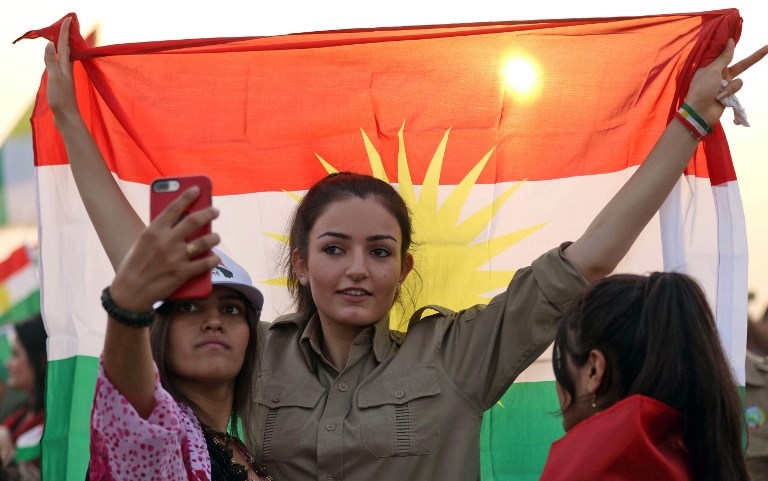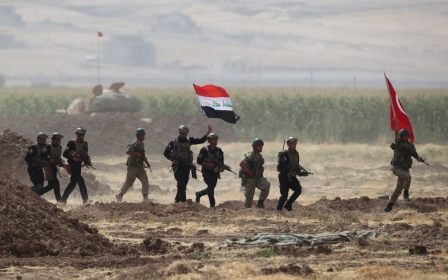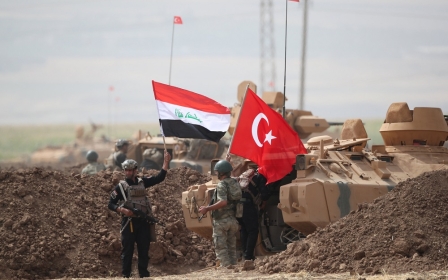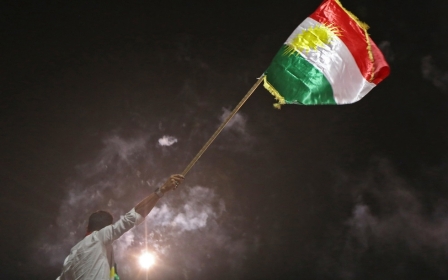Iranian Kurds march in support of independence vote in northern Iraq

Thousands of Iranian Kurds marched in the streets to show their support for an independence referendum staged by Kurdish authorities in neighbouring Iraq, defying a show of power by Tehran which flew fighter jets over their areas.
Iranian officials and media have denounced Monday's vote as a threat to regional stability, adding to pressure from Baghdad, threats from Iran and Turkey, and international warnings that it may ignite yet more conflict in the Mideast.
Undaunted by years of official suppression of dissent, residents in a number of mainly Kurdish cities in northwestern Iran danced in circles as night fell on Monday, chanting slogans praising Kurdish nationalist movements.
Videos posted on social media showed drivers beeping their car horns in celebration and people clapping in the cities of Marivan and Baneh. Many wore masks so as not to be identified by the security forces.
About 30 million ethnic Kurds are scattered across the region but have no country of their own. With 8 to 10 million living in Iran, Tehran fears pressure for secession will grow among a minority which has a long history of struggle for its political rights.
A strong police presence tried to control the celebrating crowd. There were reports of clashes between the demonstrators and security forces in the cities of Mahabad and Sanandaj.
In Sanandaj the crowd waved the flag of Kurdistan, a banned symbol for the Kurds' desire for independence.
"This referendum will encourage Iranian Kurds to be more determined to seek their rights," said Zaribar, a Marivan resident and member of the Democratic Party of Iranian Kurdistan, a secular armed group which launches periodic attacks in Iran.
"This referendum was not a threat to Iraq's neighbours, but it's a starting point to resolve the issues of Kurds, especially in Iran," added Zaribar, who declined to give his full name.
Tehran announced a ban on direct flights to and from Iraqi Kurdistan on Sunday at the request of the central government in Baghdad and called for a land blockade of the autonomous region by all neighbouring countries.
The fighter jets of the Iranian army flew over western provinces of Iran as part of a military drill, including the Kurdish cities of Sardasht and Oshnavieh.
A bumpy road to independence
Although many Iranian Kurds would like to copy the referendum model, the road to autonomy or independence would be more difficult under the Islamic Republic's theocratic rule and its military might.
The Revolutionary Guards have put down unrest in Kurdish areas for decades, and the hardline judiciary has sentenced many activists to long jail terms or death.
Iran sent guards commander Qassem Soleimani to northern Iraq last week in a failed final effort to dissuade the Kurdistan Regional Government from holding the referendum.
The result has yet to be announced but is expected to be a resounding "yes" to independence.
One Kurd from Baneh, who gave his name as Arbaba, said he was exhilarated "from the bottom of my heart for victory in the referendum". However, he was worried it would increase pressure on Iranian Kurds to prevent them from going down the same path.
"The Iranian regime will militarise the Kurdish areas even more," Arbaba said.
For the Iranian state the referendum of the Kurds' demand for state of their own was a "Zionist plot" aimed at bringing instability to the region.
"This view that a wandering scattered nation would only find peace if they find a homeland, was the core philosophy for creation of Israel," wrote the Kayhan, a hardline newspaper closely associated with Supreme Leader Ayatollah Ali Khamenei.
However Iranian cleric Abolfazl Najafi Tehrani criticised the historic treatment of the Kurds across the region.
"Unfortunately in Iraq, Iran and Turkey, the central governments have not provided Kurds and other residents of border areas with welfare facilities and economic development they deserve," Najafi, a political activist, told Reuters from Tehran.
"That is why Kurds do not want the rule of any central governments."
New MEE newsletter: Jerusalem Dispatch
Sign up to get the latest insights and analysis on Israel-Palestine, alongside Turkey Unpacked and other MEE newsletters
Middle East Eye delivers independent and unrivalled coverage and analysis of the Middle East, North Africa and beyond. To learn more about republishing this content and the associated fees, please fill out this form. More about MEE can be found here.




